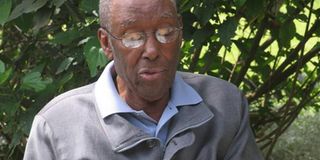Njoroge Mungai aimed for the apex; he never quite reached it

Dr Njoroge Mungai at his Kikuyu home. FILE PHOTO | JOSEPH KANYI |
What you need to know:
- Rivalry: Mungai led one faction in the Kenyatta succession while Njonjo led the other.
- Mungai may have lost the succession battle, but he made a very good mark as foreign minister.
It is a pity Dr Njoroge Mungai passed on before writing his memoirs. Last December, he told TV host Jeff Koinange in an interview that he was working on a book, but he died before anything came out.
Sadly, a player who was in the centre of the ring from the time of Kenya’s independence has gone to his maker and left us without the benefit of his wealth of historical and anecdotal information.
Only Joseph Otiende remains alive of the ministers in the first post-independence Cabinet.
Clearly, a man who was the personal doctor, confidante and relative of the founding president held deep secrets.
Could it be true that heart attacks Mzee Jomo Kenyatta reportedly suffered in the late 1960s and in the early 1970s had a bearing on the seismic realignments in government at the time?
Mungai was the leader of one of the two main factions that competed for the Kenyatta succession. In his camp there were Gema heavyweights (though not all) like Njenga Karume and Jackson Angaine. Paul Ngei was also in this corner. The other camp was led by Charles Njonjo and in it were Mwai Kibaki and Daniel arap Moi.
Contrary to later fiction, Moi was never the leader of this faction but was the convenient frontman for Njonjo, the real puppet master. This camp, too, had formidable Gema members like Gikonyo Kiano, Charles Rubia and Maina Wanjigi.
Njonjo eventually emerged the clear victor over Mungai. Some people allege involvement of the invisible hand of the British intelligence service in the showdown.
TOTAL HUMILIATION
Several years later, Njonjo was to underscore Mungai’s total humiliation when he summoned him to his Muthaiga home to witness the arranged release from Kamiti prison of two of the doctor’s former footsoldiers, Jesse Gachago of Makuyu and Muhuri Muchiri of Embakasi. They had been jailed on Njonjo’s watch on a charge of coffee theft.
Mungai’s 1974 electoral defeat in Dagoretti Constituency altered the succession contest enormously. It removed him from political circulation in Parliament and the vital perch in the Cabinet. Though he was shortly after made a nominated MP, he never quite recovered his stride.
There have been many misconceptions about the role of Mbiyu Koinange in Mungai’s ill-fated change-the-constitution project and in his rivalry with Njonjo generally.
Both Duncan Ndegwa and Jeremiah Kiereini have written in their autobiographies that Koinange was no more than a soulmate and cherished buddy of Old Jomo.
Mzee did not need him for serious political advice. That was left to others. Once Mzee died, Njonjo and Moi felt it opportune to sideline Koinange because he no longer served any purpose.
BUILT RELATIONS
Mungai may have lost the succession battle, but he made a very good mark as foreign minister in building relations with the OAU and the leaders of the liberation struggles of southern Africa.
The same policy was amplified by his fellow medical doctor and successor at the Foreign ministry, Dr Munyua Waiyaki.
The two men were a necessary corrective to Njonjo’s fawning Anglophilia and his embarrassing willingness to accommodate South African Boer interests. (Remember Waiyaki’s retort that diplomatic relations with apartheid South Africa could only happen “over my dead body”?).
The “traitor affair” eventually finished off Njonjo as a political force once Moi was comfortably in the saddle. The new president knew he would never really call the shots as long as the old kingmaker was breathing down his neck.
Moi obviously felt less threatened by Mungai and thus allowed him a measure of political latitude. Mungai would serve as Kanu chairman in Nairobi in the 1980s and was even appointed minister for the Environment in 1990.
It was not that Moi had suddenly got fond of his old nemesis. It was because he knew Mungai was now a spent force, useful only in being occasionally deployed in Moi’s divide-and-rule games against the likes of Charles Rubia in Nairobi.
Mungai did defect to join Ford in 1992, only to mysteriously re-defect back to Kanu soon after, before disappearing into the oblivion of his very considerable private businesses.
In 1978, Njonjo’s candidate became President. Mungai had the last laugh last year when the candidate he campaigned for in 2002 finally made it.





